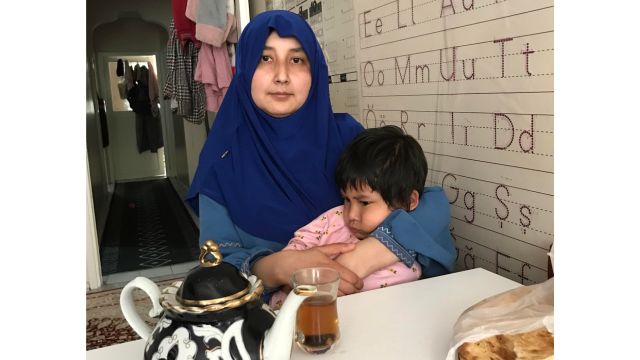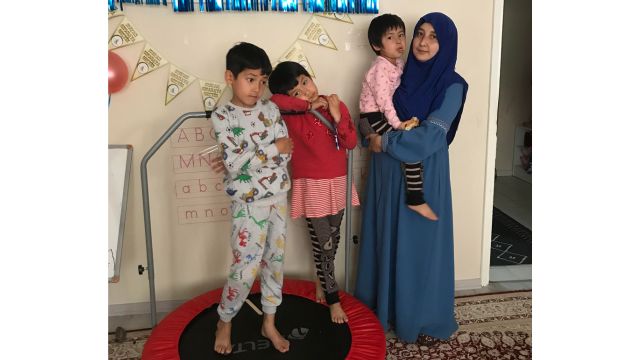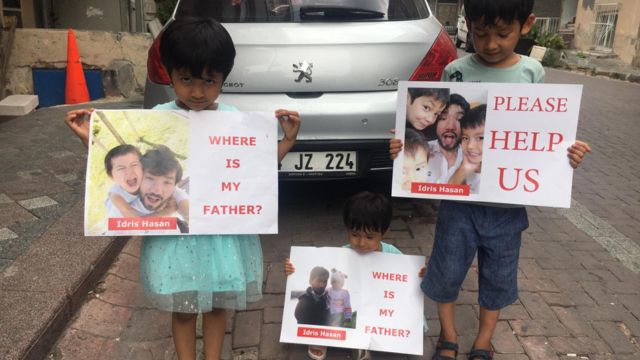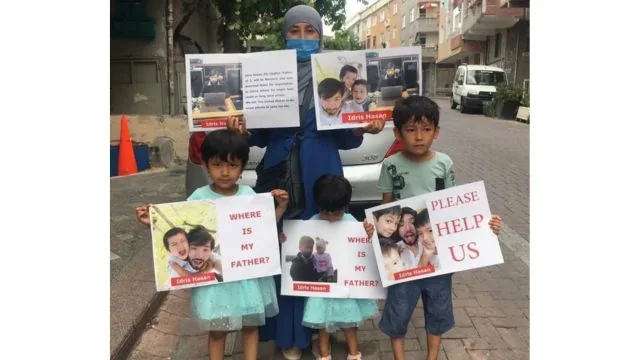Idris Hasan paces his one-man cell, carefully skirting the latrine through which at night, if not plugged, large rats emerge to taunt him.
His wife Zeynure, 3,000 kilometers away in Istanbul hangs out for the three times weekly, ten-minute calls with her husband, more than two years into his extrajudicial internment in Morocco’s Tiflet jail.
She spoke to “Bitter Winter” at her home in Istanbul about the anguish and powerlessness she feels as the months become years and her husband’s release seems as elusive as ever.
His familiar voice at the end of the line reassures her that at least he is still alive, but the calls are fraught with uncertainty and frustration over his future. When, if ever, they both ask, will he be freed?
The Uyghur couple and their three children, Abdulkerim, 9, and his sisters, Nefise, 6, and Uyguray, 4, have been separated since Hasan became the victim of an Interpol Red Notice, issued by China alleging international terrorism, as he landed in Casablanca on his way to Europe from Turkey in search of a better life for his family in 2021. He has been in solitary confinement in Morocco’s notorious Tiflet jail since then, despite the Red Notice against him being annulled in early 2022.
He has lived under the cloud of repatriation to China ever since and only the intervention of the Committee Against Torture, a treaty body of human rights experts that monitors implementation of the United Nations Convention against Torture, has been able to stay the threats to date.
Red Notice requests intended to catch bona fide criminals fleeing justice in their own lands are prone to abuse according to a panel convened recently in the U.K. The notices, served by law enforcement worldwide to locate and provisionally arrest a person pending extradition, have been misused by states such as Russia and China to rein in persons deemed enemies of the state, often with very little proof of criminality.
Hasan’s story began in 2013 when he and his young wife Zeynure left China as newlyweds and arrived in Istanbul with dreams of a future where they could freely practice their Islamic faith. Already back in their homeland of Xinjiang they could see the writing on the wall for Muslims who took their religion seriously when in 2011 Beijing’s policies restricting Islamic observance descended on their hometowns.
She had been free to wear a headscarf and wear a long skirt during her years as a nursing student in inner China, and both she and her husband to be, a chemistry student, also in mainland China were free to attend the mosque and pray.

But on their return to Xinjiang upon graduating it was a different story. Beijing was clamping down in their Muslim heartland; her headscarf and mosque visits were not welcomed if she wanted a government job, and doors started to close for both of them.
They married and left as soon as possible for Turkey; she via Egypt and he via Malaysia.
Turkey hosts more than 50,000 Uyghur refugees who have made the country their home since political upheavals began in China in the early 1950s.The latest wave arrived between 2015 and 2017, following an official crackdown on Uyghur culture in Xinjiang, when more than one million mostly Muslim Turkic people, including Uyghurs, Kazakhs, and Kirghiz were rounded up and corralled into so-called “Vocational Training Schools.”
All seemed to be going well at first, having been given a two-year, renewable humanitarian visa on arrival in Istanbul. But in 2014, with a three-month infant in tow, when Hasan applied for Turkish permanent residence for his family, local police detained him, pressured, Zeynure said, by China, where authorities claimed he was a national security threat. After two weeks, Idris was released, but for the next seven years, he was detained repeatedly without explanation, often for months at a time, and once for a year.
Zeynure has no idea what has been behind Beijing’s relentless pursuit of her husband, or why Turkish authorities have been happy to arrest him on a whim, detain him without trial or recourse to legal counsel and then as if nothing has happened, release him. “They never apologized, gave a reason or compensated us for his wrongful imprisonment,” she told “Bitter Winter.” “China’s accusations never stood up in court over the Red Notice,” she said. “They presented no facts and offered no evidence.” “My husband is not a terrorist and committed no crime in China,” she said.
Zeynure puts on a brave face, evenly recounting Idris’ multiple arrests, and the long stretches of not knowing where he was and what might be happening to him at a series of detention centers around Turkey for those slated for deportation: first in Istanbul, then in Kayseri, next in Erzurum, and finally back in Istanbul’s Kumkapi quarter.
Telephone conversations with her husband reveal a life of squalor and loneliness, broken only by the arrival three times a day of a bowl of vegetable gruel and a daily hour of exercise when he is given limited association with other prisoners. When Zeynure dared to demonstrate in front of the Moroccan Consulate protesting her husband’s situation, even that was denied him for a few weeks and he was forced to pace the quad alone.

A former prisoner in Tiflet, Meir Littman, an Israeli American briefly met Hasan in jail. He had also become subject to an Interpol Red Notice after falling foul of the French tax system, when he attended a wedding in Casablanca. He spent several months in captivity while lawyers negotiated his release following which he spoke to Zeynure in April 2023 expressing the hope that her husband might soon be freed.
Littman also spoke to “Bitter Winter” about life in the jail. The section of Tiflet prison where they were detained seemed to be the dumping ground for foreigners in the same position as him, and a variety of small-time criminals. Women were kept in a separate section with 40 or 50 children under five years old. Conditions were cramped for the 1,200 or so prisoners. Fifteen people slept in cells with space only for eight people who all slept on the concrete floor on a blanket.
Littman said he was anxious “to tell the world” of the unjust imprisonment of a man “who had committed no crime.” “It’s really not fair and not normal what they are doing to him,” he said.
They used to shout to each other in broken English through their cell door hatchways, and eventually Hasan was allowed to pace up and down in a quad with Littman and one other prisoner, free association having initially been denied Hasan because of his terrorism designation.
Food was basic and served through a hole in the door and the air was rank, permeated by the smell of the pit latrine in the room, through which rats would emerge at night if the toilet opening was not blocked as they went to sleep. This happened once to Idris, said Littman. Two rats, the size of cats. He was forced to bludgeon them to death.
Temperatures in the airless cells rose to nearly 50 degrees centigrade during the day and bugs and mosquitoes were their constant companions. They were allowed showers two or three times a week. “It was so hot that we couldn’t breathe,” he said. “We had nothing to do all day. We just lay there thinking about our futures,” he said.

Medical issues took weeks to be dealt with and Hasan’s health was deteriorating, said Littman. Without money, he could not pay for a good lawyer, or afford medicines, fruit, or supplements to his meager rations.
During their daily pacing, they talked endlessly about families, their children, their wives, life on the outside, and the first meal they would eat after release. They dreamed about simple things like flushing toilets, sweet-smelling air, pasta, and pizza. Hassan told Littman that his solitary days were spent “waiting, waiting, wailing, and waiting again.”
The guards continually taunted Hasan. Despite the cancellation of his Red Notice a few months into his detention, Hasan continued to be kept without cause. “Any day now,” the guards would say, recounted Littman. “Just three months and you can go to Canada or to Europe,” they would mock. “This was driving him crazy,” said Littman.
“How can this be happening in 2023?” he asked. “There should at least be basic human rights employed in his case. Here is a man who has committed no crime, but he is being kept in prison like a common criminal.”
Omer Kanat, head of the Uyghur Human Rights Project said that he is in constant talks behind the scenes with the US State Department over Hasan’s fate, but so far they have failed to find a third country willing to accept him. Beijing continues to demand Hasan’s return to China, and Morocco, in debt to the superpower is nervous of letting him go. United Nation member states, afraid to stand up to China, look on from the sidelines as the injustice continues to unfold.

While nations quibble over the fate of one man, his future and indeed his life, if he is returned to China, hangs in the balance and his family are left with no option but to count the hours and the days, and wait.
“Our children have lost their father. I have lost my husband. And why? What has he done and what have we done wrong?” She asked. We have no choice but to carry on, but it is a daily torment.”
bitterwinter.org

